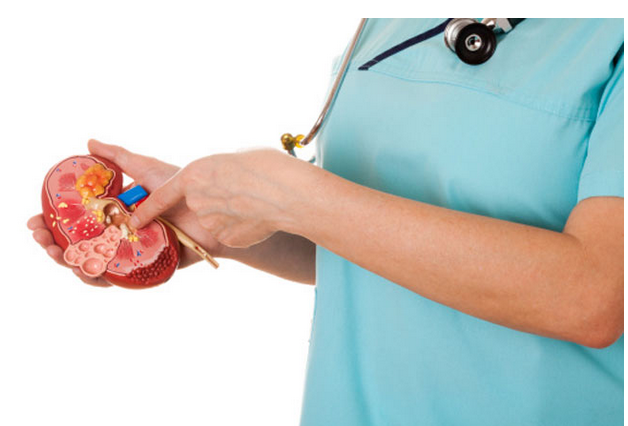Kidney stones are one of the most common disorders of the urinary tract and one of the most painful with high risks of recurrence. People with certain diseases and conditions or those who are taking certain medications are more susceptible to develop kidney stones. Urinary tract stones are more common in men than in women. Most urinary stones develop in people of middle age and those who are susceptible to multiple attacks of kidney stones usually develop their first stones during the second or third decade of life. People who have already had more than one kidney stone are likely to develop stones in future. Hence, it is important to be aware of some early signs of kidney stones, and fix an appointment with the best urologist in the city, so as to be saved from unnecessary complications and protect from repeated recurrence.
Kidney stone presence is easy to identify though there may be multiple ways they make themselves known. It is a blessing if one is unaware of having a stone and if the stone is passed out without any discomfort. Many times, small stones are passed out undetected. There are few factors which determine how fast a stone may be passed. Size and location of the stone are the main of those factors. If the stones are bigger, they may scrape the inner walls of the kidney, ureter, bladder or urethra while passing or at times may obstruct urine flow. The block may cause the flow to back up in to the kidney causing the kidney to swell and get inflamed. Severe symptoms appear requiring medical emergency. Similarly, stones that are located close to the opening of the ureter in to the bladder may not present symptoms whereas stones that are passed from the kidney all the way down through the ureters will cause noticeable signs and symptoms. Signs that appear in the early stages need to be addressed for on demand medical advice and remedies that allow easy passing of the stone without much intervention.
Some of the early signs of kidney stone presence are listed below:
Pain
kidney stone pain may start as a dull ache usually felt in the back, side, under the rib cage or abdomen.The pain can rapidly escalate to severe cramping or sharp, wincing pain that radiates in to the lower abdomen or groin. The pain is described to be varying in intensity from being horrible at one minute and fading away the next minute. This type of pain that follows a pattern of waves is termed as episodic renal colic. According to the National Library of Medicine, an episode of pain is found to last from 20 to 60 minutes. When the stone reaches the ureter and is big enough to block urine flow, the pressure on the kidneys causes severe pain. Kidney stone pain is experienced as being equivalent or more than labour pains at child birth. In men, stones can cause pain at the testicles or even the tip of the penis. A stone that is acting up will not allow the person to sit still but toss, twist and turn to find a more comfortable position that eases the pain. Worrying pain around the back or near the kidneys needs to be examined by a doctor who can examine and find if the pain is from the kidneys or the region around the spine.
urination/frequency
People with kidney stones feel the need to urinate more often. Irregular intervals of the need to urinate are a major sign of kidney stones.This varies depending on the location of the stone. Bladder symptoms of urgency, increased frequency and passing small amounts of urine indicate a stone close to the bladder. The walls of the bladder get irritated by the presence of the stone and in turn the bladder muscles contract rising the urge to urinate. This can occur even if the bladder is empty and often makes one think that there is trouble letting out the urine. This symptom is usually confused with symptoms of Urinary Tract Infections. The actual trouble of urinating happens only when the stone is in the urethra and is obstructing the flow of urine.
Nausea or vomiting
Back flow of urine in to the kidneys caused by a stone block in the ureter can make the kidney swell and stretch. Nausea and vomiting are resultant signs of gastro intestinal disorder caused by the stretching of kidney in case of stones. One other reason for the signs of nausea/vomiting is that there is a single nervous pathway common for kidneys and Intestines. Disturbance in the kidneys can send sensory messages from the shared part of the spinal cord to the intestines that trigger queasiness and throwing up of food. Continuous vomiting can cause dehydration and worsen kidney stone symptoms. Timely treatment and care with fluids would be appropriate.
Urine – Blood/Cloudy/Odorous/
The urinary tract tissues can undergo tearing and bleeding easily while passing a stone. Bleeding can be severe, microscopic or intermediate. Urine with blood may either look bright red, pink or appear like cola. If bleeding is microscopic – not visible to the eye, urine analysis will reveal blood cells in urine. If bleeding is continuous and severe, emergency medical care is absolute requirement. Cloudy urine indicate pus cells in urine that does not allow it to be clear. Pus cells are usually a positive sign of infection in the kidney or the urinary tract. Struvite stones are caused due to renal infections. Apart from being cloudy, if the urine has a foul, pungent smell and if the odour gets worse with time, it is a definite sign of infection. The infection has to be contained to protect from kidney stones.
Fever/chills
High fever is a typical sign of infection with or without kidney stones.Chills are felt along with high fever in case of infection causing kidney stone. Fever with urine block is an emergency situation. The obstructed kidney will not respond to antibiotic therapy and can lead to complications such as sepsis.
Pain or burning with urination
If pain or burning while urinating is experienced, chances are that the stone moving through the ureter is getting close to the bladder. Burning with urination is more common with urinary tract infections than with kidney stones. So, a right diagnosis is vital at the earliest.
Signs of Kidney stones may vary between genders and ages respective of the structure of the urinary tracts.
In men – Abdominal, groin or pain in lower back and gastric discomfort are the early signs.
In women -Pain/itching in the vulva, discharge and menstrual pain are more commonly the first symptoms.
In children – Restlessness, differences in urine colour, frequency of urination and blood in urine are noticeable signs.


